- Home
- Will Hobbs
Take Me to the River Page 3
Take Me to the River Read online
Page 3
This was going to take a while. Roxanne lifted only one foot at a time. I gained an insight into how Rio entertained himself.
You wouldn’t have known this house had been resurrected from a ruin. The thick stone walls were plastered smooth and painted white as cream. The window frames were turquoise blue. The floors were smooth concrete with a light blue tint.
We took our coffee mugs and a couple of bagels outdoors to a patio table under a “ramada,” as Rio called it, a shade break of thatch supported by four poles. This early, we weren’t in dire need of shade. The morning air was almost too cool for T-shirts and shorts. I let out a massive yawn and said, “I could’ve slept another six hours.”
Rio shrugged. “If you don’t have AC, you have to take advantage of the cool part of the day or you’ll go mental.”
My finger went to my swollen lip. “Conenose bug got you,” Rio said. “It’s also known as Mexican bedbug, or assassin bug. Nasty sucker.”
“I didn’t see any. Are they tiny?”
“Not at all. They’re half an inch long, sometimes longer. Mostly they prey on insects. Their long beak injects saliva with a toxin that dissolves tissue, then sucks the insides out of the insect.”
“Your assassin bug mistook my lip for an insect?”
“Unfortunately, they also snack on mammals. With humans, they usually go for the lips, which is why they’re also known as kissing bugs. They’re a royal pain. You never know when it’s happening because the first thing they do is inject an anesthetic. Something else they inject makes your heart start racing, but only when they’re done and gone. That’s when you wake up.”
Just then, the sun began to rise over the Chisos Mountains. The first rays fell on a covey of quail darting across the flagstones behind Roxanne, who was climbing over the doorsill again. A roadrunner with a lizard in its mouth ran the length of the low wall that ringed the patio. It was the first I’d seen outside of a cartoon.
We headed back to the house for more coffee, not that I needed any. Stepping over Roxanne, who was headed for the bookcases, I checked out the art and photos on the walls while Rio was pouring. What caught my eye first was a piece of art the likes of which I’d never seen—a large hubcap painted in bright acrylics with a geometric design around the outside and a river scene at the center. A Mexican boy was sitting on a ledge and watching the Rio Grande as it wound through a canyon.
My eye caught the signature at the bottom of the hubcap. “Ariel painted this!”
“I told you she was an artist. Her hubcaps are all over West Texas.”
We started in on some cold cereal. A spiral-bound guidebook on the bookcase caught my eye, the mile-by-mile guide to the Lower Canyons of the Rio Grande. This was the section of the river I’d come out to paddle. I jumped up and brought it back to the table.
The guidebook contained photographs of canoes running the biggest rapids. I was riveted, but it was a tantalizing what might have been.
Rio wasn’t saying a thing, which was understandable under the circumstances. As I set it aside I said, “Those Lower Canyons look plenty challenging. It would’ve been a blast. Sorry if I drooled all over your book.”
Rio had a look in his eye. “Maybe we can still go for it.”
“Really? How’s that? You got my attention.”
“It’s a week-long trip . . . wouldn’t that be awesome, just the two of us?”
“No question,” I said, putting aside for the time being my first thought, which had to do with my parents. “You really think we could?”
“I don’t see why not. The only problem is, I don’t have enough money saved up. I could swing the groceries, but there’s a lot of driving involved. Another one of Ariel’s gigs is driving shuttles . . . I’m thinking she might help us out if we could pay her gas.”
“I brought some spending money. How much gas money are we talking about?”
Rio grabbed a map and put pencil to paper. Around two hundred dollars was the answer. Ariel’s round-trip driving on the front end would be 120 miles. The round-trip at the back end would add another 300 miles. I told my cousin I was good for the gas money.
“Is your bus ticket already paid for?”
“Same as the airline ticket. Both were round-trips.”
“Grab your flip-flops. I’ll show you our stuff.”
Rio led me out to the shed behind the house where they kept their river gear: a raft with frame and oars, coolers and propane bottles, life jackets, watertight food boxes, “dry bags” for storing personal gear, and on and on. The canoes were real beauties, sixteen-foot expedition-type Mad Rivers that flared widely through the middle for high-volume loads. Both bow and stern had a curving lift built into them, like the ends of a rocking chair leg, to deflect incoming whitewater. “You think your dad would be cool with it?” I asked. “Us going by ourselves?”
“I’ve been thinking about that. Yeah, I do. What about your folks?”
“I’d have some explaining to do. . . . They’ve been talking about me making independent decisions and suchlike. They know how hard I’ve worked for it. They knew it would be an adventure.”
“It would be an adventure, that’s for sure. Your call, Dylan.”
I told him I was leaning strongly in favor.
It was a three-minute walk to Ariel’s place, a school bus. Painted with colorful desert scenes, it was a real eye-catcher. Ariel was outside, painting a hubcap under a ramada like the one shading Rio’s patio table. She said she’d be happy to help us out with the driving.
The hubcap artist asked if we wanted to use her email. I took it she was talking about me running everything by my parents. Asking their permission, that is.
Inside Ariel’s bus, which was beautifully tricked out, my head was spinning. I wasn’t in any hurry to jump on the computer.
Rio could see I had a whole lot on my mind. He sat down to check the weather forecast and email some friends. I figured this was how he’d been emailing me. I went outside to sound out Ariel about my cousin. I asked how come she was confident about Rio and me heading off on our own.
“Rio is in his element when he’s on the river,” she told me. “I know. I’m an old river guide myself. If you two hang around the ghost town instead and bicycle up and down the highway and mess around near the mineshafts like kids do, that would be more dicey, in my opinion.”
Not to mention, I thought, that on the river I would be sleeping inside a zippered tent and not in my uncle’s bed with assassin bugs. “Thanks,” I said. “That’s what I wanted to hear.”
Rio came out of the bus. “Your turn,” he said. I went inside and emailed a message home. I told them that everything was great. I left out certain details like any mention of Rio’s father or his whereabouts. I said we’d be going on the river soon.
Chapter 6
Take Me to the River
BEFORE NOON THE NEXT day, Rio and I were on the road to adventure with Ariel at the wheel of her relic of a pickup. We were going to bite off even more of the river than we talked about at first. Not only were we going to run the Lower Canyons, we had tacked on three days upstream for a total of ten days.
Why three more days? That was Ariel’s idea, and we were happy to oblige. On our first day we were going to drop some donated supplies at a Mexican village called Boquillas del Carmen. It was all good, according to Rio. After dropping the donations, we would run Boquillas Canyon, a spectacular section of the river I would have missed had we started our trip downriver, at the put-in for the Lower Canyons.
Our sixty-mile drive to the river skirted the Chisos Mountains on their north side, then dropped into a starker and starker landscape dominated by creosote bush and by ocotillo, which resembled buggy whips. We were going to intercept the Rio Grande at a place called Rio Grande Village, in a far corner of Big Bend National Park.
Ariel’s old pickup didn’t have AC. The heat was so intense, we had to keep the windows down and blast air through the cab by opening the fins on both sides. Conversati
on was impossible. As the miles rolled by I was left alone with my thoughts, which were up and down and all over the place.
I had a queasy feeling in the pit of my stomach, and it wasn’t from something I ate. This wasn’t anything like I’d been picturing this trip since forever, like my parents were picturing it right now, with my uncle along. I was in uncharted territory in more ways than one. I hadn’t told my parents any lies, but I hadn’t told them the truth, which pretty much amounted to the same thing. Would they have given me the green light, knowing it was going to be just me and Rio?
The chances of that were slim to none.
I hated the way this felt. It felt like I was starting down a slippery slope. To have come this far, though, only to turn back and go home—that would be totally unacceptable.
Before any river trip, you get the jitters. Man, did I have them now. I felt like asking Ariel to stop the truck so I could throw up on the side of the road.
Ariel picked up on my state of mind. “Nervous?” she asked me, almost shouting. I was right at her side, sandwiched between her and Rio.
“I always get some butterflies,” I admitted.
“That’s good, that’s normal. These canyons are something special. You guys are going to have an awesome trip.”
“Hope so,” I said.
A few miles on, and something new came into view. Between us and a soaring mountain range, a winding strip of bright green vegetation marked the course of a river. I let out a whoop when Rio confirmed it was the Rio Grande. I could feel my adrenaline jets beginning to fire. There is nothing, absolutely nothing, that beats moving water.
As Ariel drove into Rio Grande Village, Rio explained that it wasn’t much of a village. For the sake of the tourists, Big Bend National Park had a campground here, a visitors’ center, and a general store that sold gas and groceries. At midsummer, with the temperature around a hundred every day and the price of gas having soared out of sight, we found it virtually deserted. There were only two RVs parked in the cottonwood-shaded campground.
I ran up a trail to a hilltop for my first look at the river. Rio was on my heels, and Ariel was following at a walk. Once I got to the overlook, I didn’t know what to make of what I was seeing. This couldn’t be the Rio Grande. It looked more like a drainage ditch. “Uh, where’s the river?” I asked my cousin.
“You’re looking at it,” he replied.
The riverbed was fifty yards wide, but mostly dry. The river itself was less than fifty feet wide and mostly ankle deep. At its deepest it might have come up to your knees. The water was pea green, not my favorite color, with no discernible current. “C’mon, you’re kidding,” I said. “This is a side channel, right?”
“Afraid not. That’s the Rio Grande.”
“I thought you said that the river runs highest in the summer.”
“When it rains. July and August are our rainy season, but the rains haven’t started yet.”
By now Ariel had joined us on the hilltop. I wasn’t going to say a thing more about the river. I could pretty well guess I’d already ruffled my cousin’s pride. I knew the Rio Grande wasn’t going to look like the rivers back home, but this was pathetic. How we were going to go a hundred and sixteen miles in ten days, I had no idea.
The low flow must have looked so normal to Ariel, she didn’t even mention it. What she was keen to point out to me was the Mexican village where Rio and I were going to drop the donations. Even with my dark sunglasses cutting the glare, it was hard to spot. Finally I made it out, shimmering in the heat, a couple miles downriver. “Bo-KEY-us” was how she pronounced it. Boquillas sat at the foot of the soaring mountains called the Sierra del Carmen.
The stuff we were going to drop off included used laptops for the village school, some empty propane bottles that couldn’t be filled on this side of the river for some reason, half a dozen small motors reclaimed from exercise treadmills, a secondhand solar cell, an old sewing machine, and half a dozen trash bags full of fabric scraps that the women of the village would turn into quilts. It was okay to take donations across the border without going through a customs station as long as they had hardly any resale value.
We had some work to do if we were going to reach the village before dark. We were about to start down the path to Ariel’s truck when we heard the distant chop-chop-chop of helicopters.
“Border Patrol?” I wondered aloud.
The helicopters were getting ever louder. Rio had them spotted, but I hadn’t yet. “Unreal!” he shouted. “Those are U.S. Army!”
Rio was pointing north of the Chisos Mountains. Now I saw them. The helicopters, half a dozen of them, were flying low, along the route of the road we had just traveled. They were coming fast, with a whirring thunder like a breaking storm. These were serious war machines—attack helicopters. “Black Hawks!” I shouted over the din. “I’ve seen them back home at Camp Lejeune!”
“They’re heading for Rio Grande Village!” Rio shouted back.
They sure enough were. The Black Hawks circled the campground a couple of times. Twice, they passed within a hundred yards of our hilltop. The side doors of the choppers were open, with soldiers at their battle stations manning machine guns. We caught some heavy downdraft; the roar was deafening.
The gunships pulled back to allow even more helicopters to approach the river—three giant Chinooks, made for hauling troops and fuel and supplies.
The Chinooks hovered just short of the river as the Black Hawks circled them protectively. We watched the three Chinooks put down in the Park Service campground, in a clearing only a stone’s throw from those two RVs.
The Black Hawks didn’t follow them in. To our amazement, the gunships raced across the river and into Mexico.
“Mercy!” Ariel cried.
At first I wondered if they were heading for the village across the river, but within minutes, they were far beyond Boquillas and miles into Mexico.
The Black Hawks were gaining altitude rapidly, flying up and up, in the direction of the Sierra del Carmen. It looked for all the world like they were going to smack into the cliffs. It wasn’t long before they crested the forest atop the range and blinked out of view.
It crossed my mind that maybe this wasn’t such a good time to be spending ten days on the Mexican border.
Chapter 7
Good-bye, Good Luck!
ARIEL DROVE TOWARD THE visitors’ center to find out what in the world was going on. We didn’t get that far. The park ranger had jumped in his truck and raced to the campground where the big Chinooks had landed. He was already engaged in what looked like dead-serious conversation with an army officer. Behind them, three dozen soldiers were already at work unloading the helicopters.
We waited fifteen minutes before Ariel got her chance to speak with the park ranger. They knew each other by name; they were old friends. The ranger hadn’t known the helicopters were coming. The army had chosen Rio Grande Village as a forward base for some kind of operation in Mexico that they weren’t authorized to discuss, except to say it was in cooperation with the Mexican government and military. The ranger had been told to close the entrance and notify campers to leave ASAP.
“Can we still launch a river trip?” Ariel asked the ranger.
The answer was yes, as long as we did it “expeditiously.”
“What about the store?” was Ariel’s next question. “Is the store still open?”
“You might run over there real quick. My guess is, it won’t be for long.”
We piled back in the truck like our hair was on fire and raced for the store. What with a number of far-flung stops we’d made that morning to pick up the donations for Boquillas, the one-man grocery in Terlingua had closed for lunch hour before we got there. “No problem,” Rio had said. “We’ll shop in Rio Grande Village. They can use the business.”
Those fifteen minutes we had just lost waiting to talk to the park ranger turned around and bit us. The parking lot in front of the store was plumb empty as we drove in. A
sign on the door, hastily scrawled with a black marker, read, CLOSED INDEFINITELY.
Hmmm . . . , I thought.
We looked down the road that led out of Rio Grande Village. Dust was still hanging in the air from a vehicle leaving in a hurry.
“Just missed him,” Ariel said. “This summer has been a disaster for the concessionaires in the park. I guess he was thrilled to have an excuse to shut down. We could head home, boys, and try again tomorrow.”
“We could,” Rio allowed, “but the army wouldn’t let us back in. Our only shot at dropping your donations and floating Boquillas Canyon is if we launch this afternoon. We’ve got enough groceries in the truck. It’s not like we’re going to starve.”
The groceries Rio was alluding to were the sum total of the canned goods and boxed food, spices, cooking oil, and so on that he had at home. To keep the grocery bill down, he brought it all along. “What do you think, Dylan? Think we can get by?”
I allowed that I figured we could. I felt a lot better when Ariel said we could have the emergency food stowed behind the front seat of her truck, which turned out to be three cans of Spam, three cans of tuna, and a twelve-pack of energy bars. A lot of the locals carried emergency rations, I learned, not so much for themselves as for the illegal crossers they sometimes encountered on the back roads.
“I brought some fishing gear along,” Rio added. “I’d say we’re good to go.”
Ariel put her truck in gear and we headed for the put-in. There’s nothing like nearly having something snatched away to make you want it all the more.
On our left, soldiers were unloading fuel drums out of the big Chinooks. Other soldiers were erecting sleeping tents. A much bigger tent was also going up—a mess hall, maybe? Ariel backed her truck close to the river at the launch site, a bulldozed cut in the riverbank.
Ariel retreated to the shade of a cottonwood as Rio and I fell to unloading the truck. We began by undoing the canoe’s tie-downs and sliding it down from the carry racks. We tumbled the raft out of the back of the bed and rolled it aside. I couldn’t help eyeing the raft like it was a rogue elephant. Since forever I had pictured Rio and me in canoes, paddling the Rio Grande side by side. I said as much that morning, back at the ghost town, when we were loading up.

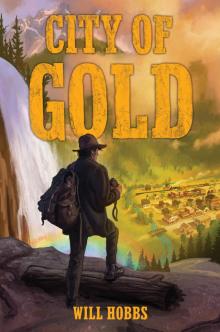 City of Gold
City of Gold Kokopelli's Flute
Kokopelli's Flute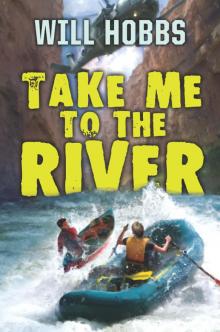 Take Me to the River
Take Me to the River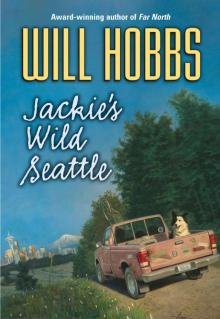 Jackie's Wild Seattle
Jackie's Wild Seattle The Maze
The Maze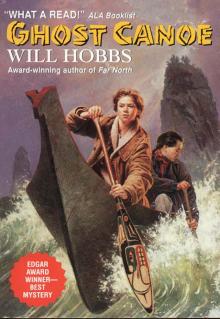 Ghost Canoe
Ghost Canoe Never Say Die
Never Say Die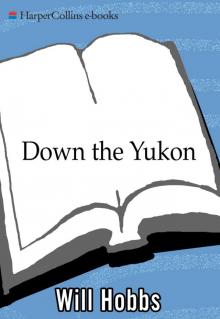 Down the Yukon
Down the Yukon Bearstone
Bearstone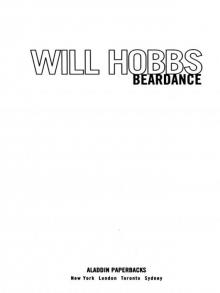 Beardance
Beardance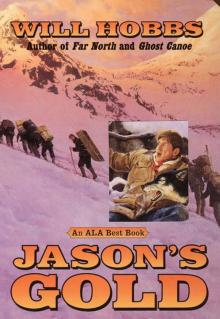 Jason's Gold
Jason's Gold Far North
Far North The Big Wander
The Big Wander River Thunder
River Thunder Downriver
Downriver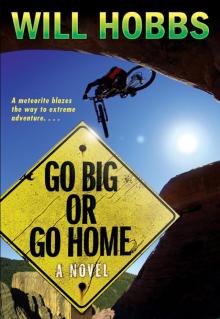 Go Big or Go Home
Go Big or Go Home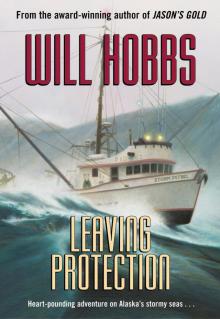 Leaving Protection
Leaving Protection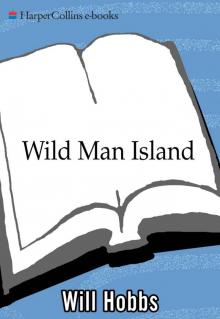 Wild Man Island
Wild Man Island